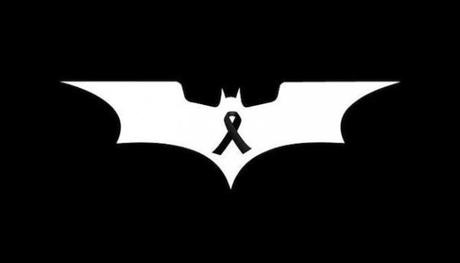
By Jonathan J. Morris, Antiscribe.com
Over the last week I’ve been striving, with significant difficulty, to write a review, essay, analysis, what-have-you, of The Dark Knight Rises. Certainly, prior to the film’s release I crafted two overviews on the topic of Batman and his history in popular culture, and naturally I wanted to make my write-up of the movie the best, most comprehensive, most insightful piece that was in my ability to do. That plan hasn’t changed, but the world I expected to write about TDKR in has, and I can’t articulate my thoughts about this movie – nor likely any movie – before I address that which has been weighing most heavily on my thoughts. Therefore, before I can discuss Christopher Nolan’s epic on both its own terms and in terms of the cinema, I feel I must talk about the Aurora tragedy and, to a certain degree, about Batman.
Of course, like so many other people throughout this country who weren’t directly affected by the tragedy, I felt heartbroken over what happened in that Colorado movie theater two weeks ago. I am, after all, someone who has spent a great deal of his life, love, and learning in movie theaters, and now to have seen others enter this kind of sacred space I hold so dearly and fall victim to the erratic violence of a deranged mind, bothers me to a degree I have difficulty describing. It’s a violation, a punch to the gut; and as so many others have stated in the last few weeks far more eloquently than I, it has forever placed a black mark on the one experience that often unifies all classes, races, creeds, and cultures into one community: the act of “going to the movies.”
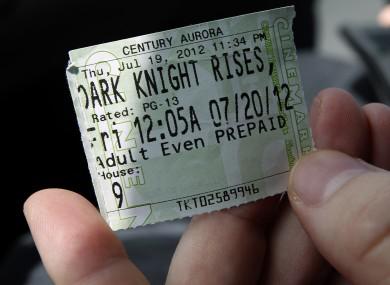
It’s also clear now, that no matter how much one may feel or describe that the Aurora tragedy, it will be forever associated intractably with both The Dark Knight Rises and with Batman. To be clear, as I said last time, that is far from the most tragic thing about what happened in Aurora; twelve lives were lost, dozens more were injured, and hundreds if not thousands in the surrounding community will be haunted by these events forever. Those are the victims of Aurora, not a fictional character (and his corporate owners) whose lucrative legacy will not likely suffer as years pass. But again, just as I felt a kinship with those victims because they were movie goers, and it is, for me, equally so because they were Batman fans. Yet it’s still weird to me on many levels to see this referred to offhand as the “Batman tragedy,” “Batman shootings,” or “Batman murders;” on the one hand I completely understand it, but on the other it bothers me. Not offends me, mind you, but bothers me. To a degree it’s almost too trivial a term; a convenient shorthand for an event that defies easy explanations or satisfactory answers. But as a Batman fan, it bothers me because the designation should offend me, and it just doesn’t.
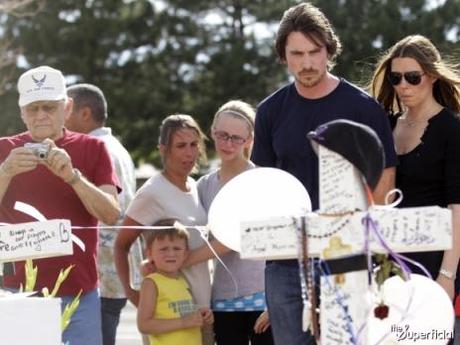
Certainly the two most divisive issues discussed in the aftermath of Aurora have been gun control and whether and how depictions of violence in our popular culture influence actual violence in the real world. Of the first point, my feelings are pretty cut and dry: our country values its supposed “right to bear arms” far too highly, and it’s a gross disregard for public safety to allow the widespread sale of both automatic weapons and high volume ammunition to any average citizen with the desire to purchase it. It frankly disgusts me that many on the right and those who simply concede the point didn’t think it was appropriate to discuss the topic in the immediate aftermath of Aurora; the ownership of semi-automatic assault rifles is a serious public health issue, not the politicization of a national tragedy. Some would point out that those weapons exist for one reason – to kill – but that’s actually an understatement; what they expressly exist for is to maximize the ability of one individual to injure and kill as many targets as possible. To think that has any place on the open market in a free society entails a definition of freedom that is actually dangerously liberal. People shouldn’t have the right to own any gun they want; what they should have is the right to not be shot, nor feel the need to own a lethal firearm of their own just to feel safe. That we license drivers, teachers, plumbers, notaries, and everything under the sun but don’t license and register every single gun owner in the country is a painfully tragic farce. Now, would James Holmes have found another way to kill, or procured a weapon illegally? Probably. Would that hypothetical other way have been as effective as a semi-automatic assault rifle with an adjusted clip he bought on the open market? Probably not. And in the interest of disclosure, I have fired a gun before in a controlled situation. I have felt the rush, the thrill, the power; I understand the appeal. I just don’t see those “benefits” outweighing the risks.
On the other issue, I’m a bit more divided, but I want to be very clear from the start: the only person responsible for what happened in Aurora, albeit allegedly, is accused gunman James Holmes. Whether or not he called himself “the Joker” or owned a Batman poster doesn’t make those characters, their corporate owners, their creators, their artists, their writers, their performers, and their fans responsible for his crimes. Whatever “drove” him to do what he did, did so likely in his own mind alone, and anyone who lets any work of popular culture influence them to such a degree has been damaged and deranged beyond all definitions of normalcy; the same was true of John Hinckley and Taxi Driver, it was true of Mark David Chapman and The Catcher in the Rye, and it would be true of James Holmes and The Dark Knight. We may never truly know explicitly what drove Holmes to do what he did or whether a Batman fixation played any significant part in his actions. The only thing I think we can all be sure of is that he absolutely chose his venue for both the elevated exposure of a high profile national event and the number of unsuspecting, unassuming victims it provided him.
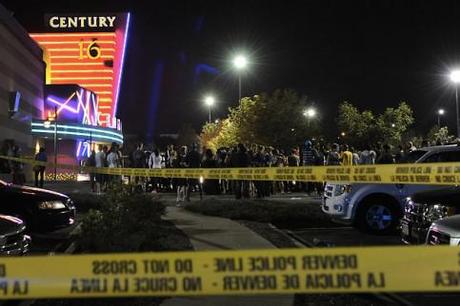
And yet, knowing all of that to be true mentally and ethically, I somehow can’t dismiss our popular culture, and especially the cinema, as easily as others do, and as much as I consciously feel that Holmes deserves the sole blame for what happened, I remained unsettled about Batman’s, and popular culture’s, connection with this tragedy. To be honest, I can’t help but think that perhaps the character’s association with what happened may be as deserved as it is unfortunate.
As said, my last post here was a survey of Batman movies, and in my introduction, which was written before Aurora and certainly designed to be largely panegyric, I spoke about how it’s always been my feeling that Batman’s best symbolism is to be seen as an ideal of how hope and greatness can sometimes grow out of tragedy. I also discussed, briefly, my discomfort with the fact that his tactics have become so symbolic for post-September 11 America and the Bush, and now Obama, doctrine. Yet there’s something else, though, that has made me uncomfortable with Batman in recent years: it’s how readily his mythology has become almost hopelessly mired in dark, nihilistic, unredeemable violence.
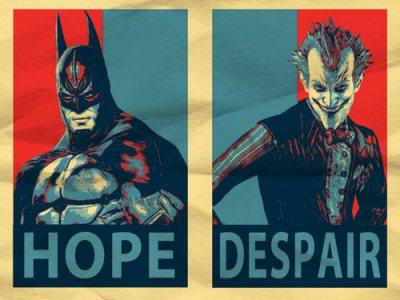
In the late 1980s, Frank Miller’s The Dark Knight Returns and Alan Moore’s The Killing Joke revitalized Batman’s place in comic books, but a very large reason for that was because they both, sometimes ruthlessly and savagely, presented the violence at the very heart of Batman and his villains. In a scenario that appears eerie in retrospect, Miller’s version of the Joker was shown killing hundreds in the studio audience of a talk show, and then later fatally poisoned a troop of Boy Scouts at a local carnival (all as a way of trying to finally drive Batman to kill him). Moore’s version of the Joker, rather infamously, shot Barbara Gordon, the former Batgirl, through the spine, and then stripped her naked and took photos of her as part of plan to drive her father insane. At the time, these depictions of brutal violence, both in scope and derangement, were much discussed and dissected, and they remain controversial, but the thing was, they were meant to be horrific and nightmarish, and ultimately that was the effect they elicited from their readers, for better or worse.
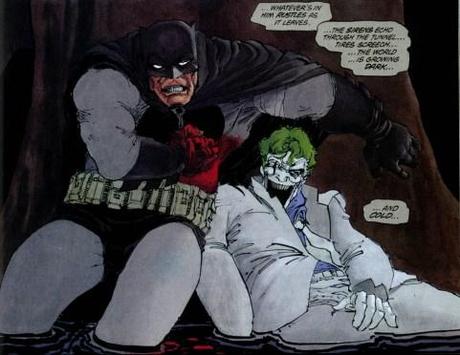
But in the years afterward, these and similar acts of horrific violence and unpleasantness steadily became the norm within the world of the comic book Batman, and the fact is, I really don’t like reading modern Batman comics because of it. My fellow contributor here on the site Andrew Golledge and I have discussed many times how appalled we are with much of the grisly nastiness and sordid unpleasantness that exists within the modern Batman. While villains such as the Joker and Two-Face have always drawn from the grotesque in their conception, over the last two decades Batman’s comic book world has given us things that would make Hannibal Lechter blanch: man-eating cannibals who are explicitly shown eating man, serial killers who tally their hundreds of victims on their own flesh, criminal masterminds who flay others alive and then wear their skin, deranged scientists who mutilate children and then make them their slaves, and black-hearted psychotics who cut out people’s eyes and force them down someone else’s throat. The Joker alone has descended into becoming the ultimate nihilistic nightmare, who forks his own tongue using a straight razor and has his own face cut off in between filling graveyards with victims, apparently just for giggles. In the last week, it has come out that DC Comics asked comic stores to hold back one of the recent Batman titles (Batman Inc. #3) because its violent content was considered too inappropriate in the aftermath of Aurora.
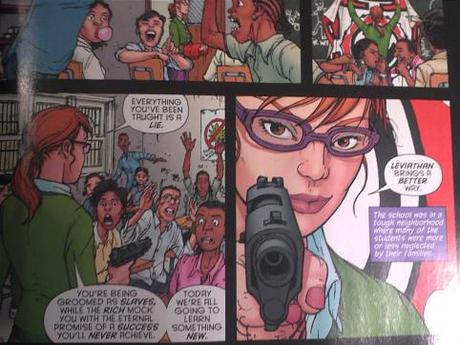
Images from “Batman Inc.” #3, which has been withheld in the aftermath of the Aurora tragedy.
In many ways as bad as the comics have been the recent Arkham series of Batman video games. Video games, of course, are entirely based on the notion of vicarious violence; the two Arkham games are no different, yet each game’s treatment of violence has been even more desensitized and questionable then the one before it. I loved the first game, Arkham Asylum, and found it to be one of the most compulsively playable games I’ve ever experienced, but I often found myself uncomfortable maneuvering Batman past the countless dead bodies of the in-game criminals’ innocent victims – who were typically cops, doctors, nurses, and guards who worked at or around the titular asylum. The sequel, Arkham City proved to be even more nihilistic, though again, I will admit that I greatly anticipated the game, and even upgraded my desktop to be able to play it. In this instance, Batman must wander through the eponymous prison city – the ultimate in urban decay – investigating all manners of murders and mayhem (including more bodies that have had their faces cut off); as an added plus, you also get to play as Catwoman as she endures all kinds of sexist slurs and threats of rape. The game’s ending, in particular, struck a very sour tone with me, as one of the game’s villains brutally slaughters hundreds of the city’s prisoners by raining bullets and missiles on them from above, while the other, the Joker, poisons thousands of Gotham’s citizens, it is implied, successfully. The game’s final scene sees a catatonic Batman cradling a dead Joker, seemingly almost in mourning, while I emphasize, again, that thousands of people are dead. It’s an extremely off-putting and morally dubious finale that seems to value the death of a villain over the death of apparently countless innocents.
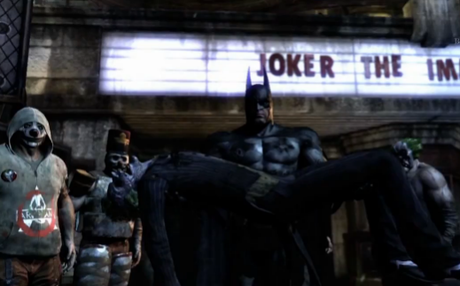
Looking at it all now, what really bothers me about Batman’s violent turn isn’t really the violence itself but the fact that it has become so casually done. It’s become as iconographic of Batman stories as the Batmobile, and so commonplace that not even Batman and his allies in storyline seem to bat an eye to it anymore (no pun intended). Indeed, even the comics’ legion of readers seems to find the violence more exciting than appalling, a printed spectacle of human degradation as bad as anything Frederic Wertham ever described, while the writers and artists seem to treat it as exemplifying their work’s inherent sophistication. I’m by no means a prude, and I enjoy violent entertainment to a point, but I just find it all to be often nasty beyond belief for what it’s supposed to be, and as much a signifier of comic books’ and video games’ ongoing status as bastard, illegitimate art forms as is their sexism and stereotyping.
Of course, far more pertinent to Aurora are the Nolan movies, and really for a cultural icon of many interpretations, this is the Batman that will be associated with this tragedy. The Nolan films themselves are as deeply emblematic of the darkness at the heart of the modern Batman as any of his other iterations, and have been the ones that most specifically correlated Batman to the War on Terror, but they at least treat each and every death as something horrible, painful, and worthy of grief, and regard nihilism as something to be stopped instead of encouraged. And indeed, the final film in the series, the one that Holmes and his victims did not see in full, implies that darkness and pain should not be something that needs to be endured forever, but to be risen above. However, one can’t deny the bitter, sad irony that films that so allegorically exploited the pain and trauma of the Post-September 11 era for their own success have now seen the real world encroach upon them and exploit them in turn.
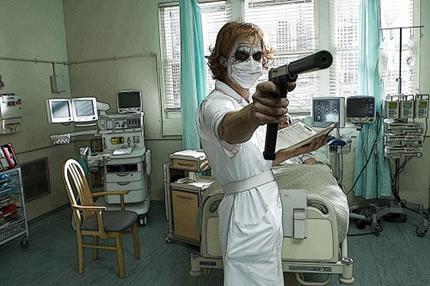
And finally, one can’t discuss The Dark Knight films without discussing the Joker; indeed, if Nolan and Ledger’s Joker wasn’t already a nexus of tragedy it will be far more so now if it’s learned that James Holmes really was inspired by that characterization. When I wrote a paper some years back on the place of The Dark Knight in the re-emergence of superhero films post-9/11, a scene that I watched numerous times, and I would say it’s probably the film’s most unnerving, was the one where the Joker and the now-scarred Harvey Dent meet face to face for the first time. In a film entirely constructed on symbolizing the War on Terror, it was an obvious analog to the act of terrorist indoctrination, and in this case depicted a seductive and deceptively logical indoctrination into the Joker’s particular brand of nihilism. I still remember on the second time watching it feeling my stomach turn with the thought that some broken individual might hear the words Ledger was saying, and, as Harvey Dent did in the film, become encouraged to hurt others. Perhaps James Holmes was that broken individual, and if so, I pray he’s the last.
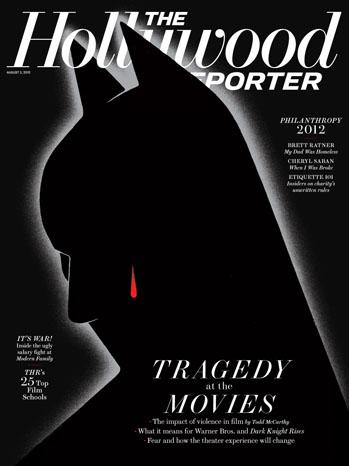
The Hollywood Repoter – Tragedy and the Movies – Aurora Commemorative Cover
Among those who willing to draw undeniable correlations between movie violence and the Aurora tragedy was Peter Bogdanovich, whose breakout film Targets (1968) featured a climax where a deranged gunman (based on real-life multiple murderer Charles Whitman) began murdering theatergoers at a drive in movie. Bogdanovich wrote an undeniably impassioned if ludicrously simplistic view of how he absolutely saw a dangerous (though flimsy) correlation between violence in the movies and in the real world in a recent Hollywood Reporter devoted to the tragedy. While I don’t share Bogdanovich’s alarmism, I do see his disgust. Anthony Lane and David Denby in The New Yorker spoke alternatively downplaying the correlation and recognizing it as a byproduct of the movie going experience, respectively. Both have excellent points, and perhaps that speaks to how there aren’t necessarily easy answers when trying to interpret these events. What they perhaps all speak to is that the role and influence of popular culture and its relationship with real world violence, while not intrinsically correlative, isn’t nonexistent, either.
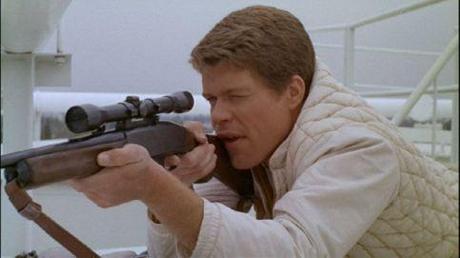
Image from Peter Bogdanovich’s “Targets,” about a gunman who goes on a killing spree that culminates at a drive-in movie theater.
Popular culture, whether it’s in the form of movies, music, novels, television, comics, or video games, is never truly benign. Indeed, being something of an adherent to the Frankfurt School, I generally look at all commercialized art (and nearly all art strives in some degree to be commercial) as having the ability to indoctrinate and homogenize a society; movies, especially, influence us, our attitudes, our morals, our ethics, our fashion sense, and in the twentieth century and now beyond have been a crucial part of the development of the individual within global society. But I also feel that as products marketed to a society they can often be as reflective as they influential, informed as much by the tastes of their audience and public as they are by the artistic and commercial tastes of their creators. Therefore, much of what may be negative in our popular culture, whether it’s violence, sexism, racism, or classism, may exist on the screen to an uncomfortable degree, but perhaps only so much as they exist still in us, or at least in our mass consciousness.
I guess my point is, when thinking about Batman in regards to this tragedy, is perhaps it’s not only disconcerting that his universe may have given a mass murderer a lexicon for how to express himself, but perhaps because his world has become too accurate a reflection and representation of our society’s capacity and willingness to both endure and even enjoy violence. As Jason Bailey of Flavorpill and The Atlantic phrased it in a piece on The Dark Knight Rises and Auroralast week, “(the film) takes place in a world where such things are not just possible, but expected.” While any sense of causation between Holmes and Batman, the Joker, The Dark Knight, or what have you, would be tacit at best, the fact that one is so much of what the other became should make us think more about how we choose to represent and enjoy violence. Which is not to say that we shouldn’t enjoy violence at all: action movies can be fun, video games can be fun, combat sports can be fun, cartoons can be fun, physical comedy can be fun, and even gory horror movies can be fun. But perhaps, in addition to reflecting on whether we should exert further controls on guns, if as a society we may want to rethink our reliance and indulgence in violence as such a vital cornerstone of what we consider entertainment. It’s not a perfect comparison (because I do think guns have a far greater causational relationship with violence than movies et al could ever strive to replicate), but perhaps those of us who too readily dismiss the idea that violence in our popular culture doesn’t have some significant relationship to violence in the real world have something in common with those people who refuse to relinquish their gun rights despite the appalling human toll of gun violence each and every year. Perhaps we are overly willing to ignore the implications in favor of the pleasure and power that comes from our vicariously experienced violence and too comfortable whistling past an ever-expanding graveyard in the name of our own gratification.
Ironically, one of the key moral dilemmas that is often posed within various of works of Batman, including the Nolan films and even Arkham City, and that is rarely resolved, is whether Batman is himself the cause of the chaos he fights, and if villains like the Joker, Two-Face, the Riddler, and all the rest would have come to be if Batman himself didn’t exist. The question remains often unanswered because it is unanswerable, equal parts right and wrong, true and false. One can’t really exist without the other, just like violence in our popular culture can’t exist without violence in our own culture. At the end of it all, though, I can’t and won’t give myself over to the perspective that pop culture directly causes chaos; that fictional violence necessarily has to lead to its real world equivalent. The outpouring of support for the victims in the aftermath of Aurora has been too great to make me think that popular culture, nor anything else, has completely desensitized us all to the senseless evil of violence when we see it. And the fact that people have been reluctant to return to theaters, and especially to The Dark Knight Rises, may be unfair to the filmmakers, movie theaters, and indeed the beloved experience of seeing movies, but it may also be partially encouraging if it means people are starting to rethink some of the content of their entertainment and letting it give them pause.
As I’ve said earlier and say still, Batman may be born of grief and violence (and particularly gun violence), but his greatest legacy is as a symbol of hope, and of taking tragedy and turning it into something positive. Maybe this event will come to remind some of his cultural arbiters of that fact, and raise him up from being someone who has wallowed in a world of filth and violence, and move him back into the light. In fact, that journey has probably already begun…
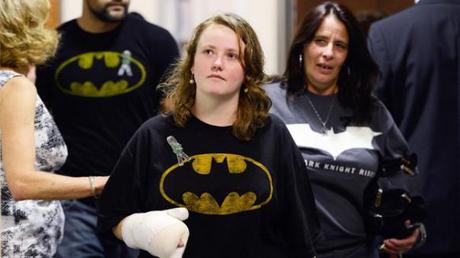
Victims of the Aurora shootings attending the arraignment of James Holmes ,wearing Batman t-shirts as a show of defiance against the self-proclaimed “Joker.”
Suggested Reading:
“A Shooting in a Movie Theater.” By Anthony Lane
“The Massacre in Aurora: Can You Blame the Movies?” By David Denby
“Batman Returns: How Culture Shapes Muddle Into Madness.” By David Dobbs
“The Philosophy of the Technology of the Gun.” By Even Selinger
“How Aurora Changed ‘The Dark Knight Rises.’” By Jason Bailey
“What If Movies Are Part of the Problem?” By Peter Bogdanovich
“We’ve Seen This Movie Before.” By Roger Ebert
“Out of the Darkness.” By Lauren Humphries-Brooks

